- 武汉大学中国边界与海洋研究院2026年博士研究生综…
- 中国边界与海洋研究院2026年博士研究生招生综合考…
- 中国边界与海洋研究院 2026年招收攻读博士学位研究…
- 博士研究生学位论文答辩公告
- 武汉大学中国边界与海洋研究院2026年接收推免生预…
- 武汉大学中国边界与海洋研究院2026年推免生预报名…
- 第八届“边界与海洋研究”博士生论坛(一号通知)
- 志愿者招募 | 2025 年中国国际法学会第六期暑期国…
- 【公示】2025年武汉大学博士研究生申请短期出访与…
- 武汉大学中国边界与海洋研究院招聘启事
- 武汉大学中国边界与海洋研究院2025年博士研究生拟…
- 中国边界与海洋研究院2025年硕士研究生调剂复试拟…
- 中国边界与海洋研究院2025年上半年博士生延期资助…
- 中国边界与海洋研究院2025年硕士研究生调剂复试名…
- 武汉大学中国边界与海洋研究院2025年硕士研究生调…
- 中国边界与海洋研究院2025年硕士统考拟录取名单公…
“国际法上的跨界水合作国际研讨会”会议简报
Symposium on Transboundary Water Cooperation
under International Law
Summary of the Proceedings
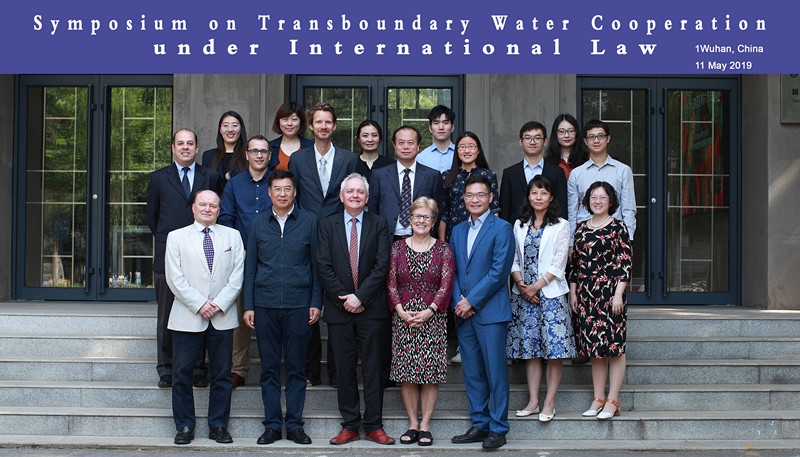
2019年5月11日,“国际法上的跨界水合作国际研讨会”在武汉大学中国边界与海洋研究院成功召开,来自英国、荷兰、爱尔兰、中国等国的专家学者围绕国际水法的最新发展、跨界水合作与国际法的相关法律问题、中国与周边国家间的跨界水合作等议题进行了深入的讨论和交流。中国水利部国际合作与科技司于兴军巡视员及外交部和水利部的同志出席研讨会。
The Symposium on Transboundary Water Cooperation under International Law was successfully held at Wuhan University China Institute of Boundary and Ocean Studies on May 11, 2019. The speakers include scholars from the UK, Netherlands, Ireland and China. The speakers and participants have in-depth discussions on the latest developments in the law of international watercourses, legal issues relating to transboundary water cooperation, and transboundary water cooperation between China and the neighboring countries. Yu Xingjun, DG-Level Consul of the Ministry of Water Resources of the P.R.C, and some other officials from this Ministry and the Ministry of Foreign Affairs of the P.R.C attended the Symposium.
发言报告摘要/Key Points of the Presentations
议题一:国际水法的最新发展:一般性评价
Session I: Recent Developments in International Water Law: General Assessment
主持人/Chair:谢尔盖·维诺格拉多夫/Sergei Vinogradov
评议人/Commentators:欧文·麦金太尔/Owen McIntyre,奥托·斯派克斯/Otto Spijkers
1. 邬霈莎Patricia Wouters
厦门大学客座教授,英国邓迪大学水法律、政策和科学中心创始人及前主任
Visiting Professor, Xiamen University School of Law, founding Director of the Centre for Water Law, Policy and Science, under the auspices of UNESCEO (Dundee, Scotland)
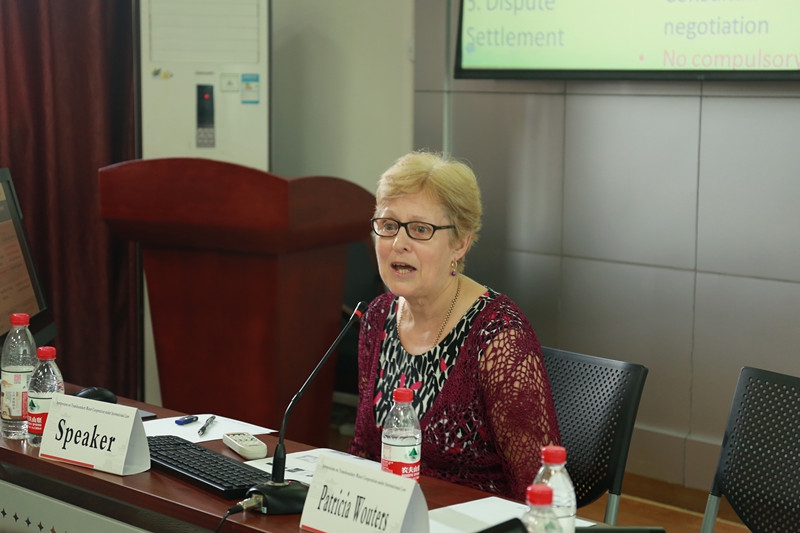
邬霈莎教授以《国际水法中的合作义务—中国跨界水合作的“柔性路径”》为题作了报告。首先,她从水文政治的角度整体分析了中国的跨界水域。中国有40多条跨界水道,与绝大多数邻国共享水资源。中国签署的跨界水协定都是双边的。中国与四个北部邻国(哈萨克斯坦、蒙古、朝鲜和俄罗斯)均有签署跨界水协定,然而涉及南部地区的跨界水协定却寥寥无几。中国在如何共享水资源利益和保护水资源方面面临重大挑战。在第二部分,邬霈莎教授介绍了国际水法的编纂过程及其核心原则,概述了跨界水域管理机制的法律框架,分析了两项全球性水道公约中开展国家合作的义务。在第三部分,她评价了中国开展跨界水域合作的法律框架。她特别强调,中国的条约实践不仅符合和平共处五项原则,而且在范围、实质规则、程序规则、体制机制和争端解决等方面都与国际水法的法律框架相一致。最后,她做了三点总结:上游困境及其对国际法的态度会影响中国的跨界水资源实践;不断变化的国际环境将产生现实的影响力;中国的睦邻友好政策促使水外交不断发展。
Professor Patricia Wouters presented her research on The Duty to Cooperate in International Water Law – China's “Soft-path” to transboundary Water Cooperation. She began by overviewing China's transboundary waters in the hydro-political context. With more than 40 major transboundary watercourses across China's national borders, China shares water resources with nearly all of its neighbors. All of China's transboundary water-related agreements are bilateral. It has concluded with its four northern neighbors, i.e., Kazakhstan, Mongolia, North Korea and Russia transboundary water-related treaties. In contrast, China has not yet concluded such agreements with the neighours in the south. Prof. Patricia Wouters pointed out that China faced a major challenge as to how to share benefits and protect the watercourses. In the second part, Prof. Patricia Wouters gave a comprehensive overview of the codification and key principles of international water law, the legal analytical framework governing transboundary waters, and the duty to cooperate as a bridge rule for the two global watercourse conventions. In the third part, Prof. Patricia Wouters evaluated China's legal frameworks for cooperation on transboundary waters. In particular, she brought to our attention that China's treaty practices are in line with the Five Principles of Peaceful Coexistence and are consistent with the legal framework of international water law in terms of scope, substantive rules, procedural rules, institutional mechanism, and dispute settlement. She concluded her presentation by observing that (a) the upstream dilemma and its approach to international law influences China's transboundary water practices, (b) the changing international realities will affect realities on the ground, and (c) China's good neighbor policy has resulted in incremental hydro-diplomacy.
2. 冯彦 Feng Yan
云南大学国际河流与生态安全研究院教授
Professor of the Institute of International Rivers and Eco-security at Yunnan University
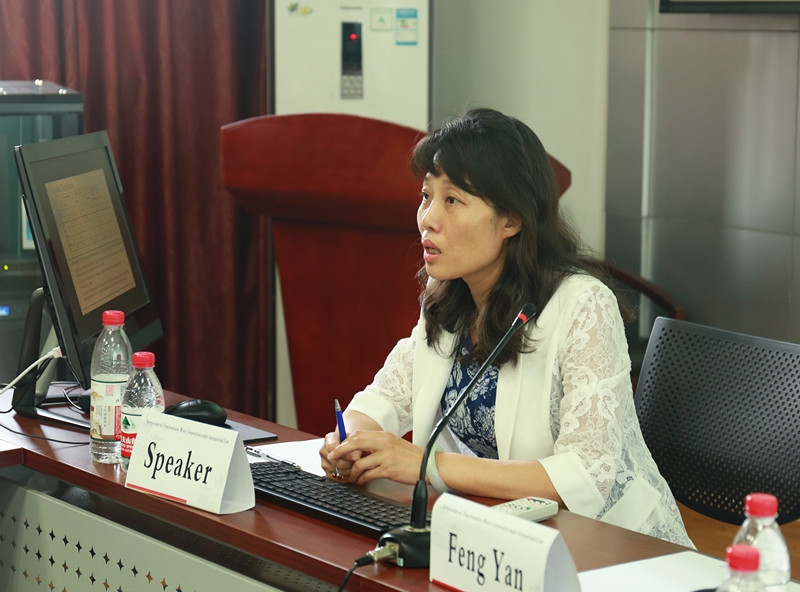
冯彦教授就《联合国国际水道法公约被认可的区域差异性》作了主题报告。在报告的前半部分,她使用详实丰富的数据展示了《联合国国际水道法公约》36个缔约国的区域分布差异,并介绍了缔约国在国际河流上区位差异及其对水资源的贡献。她指出加入《联合国国际水道法公约》的国家主要为下游国,国际河流所占流域比例较大的国家往往比占流域比例较小的国家更重视跨界水域。然后,她分析了水资源利用问题,指出50%以上的缔约国用水紧张,其中大多数是下游国家,并且亚洲和非洲缔约国面临缺水问题。在后半部分,她展示了缔约国之间的国家合作实践,指出大部分缔约国都有丰富的跨界水合作经验,而区域性水法的发展和实践是流域国加入《联合国国际水道法公约》的基础。通过比对《联合国国际水道法公约》约束力的区域差异,她指出尽管下游国签署和加入《联合国国际水道法公约》的意愿较强,而《联合国国际水道法公约》对位于中游、边界、上下游均衡及支流地区的流域国之间形成相互制衡作用。
Prof. Feng Yan spoke about Differences among the Parties to the UN Watercourses Convention. In the first half of her presentation, she used detailed and varied statistics to show the regional distribution and different geographic positions of the 36 Parties to the Convention and to present the proportions of the Parties’ international river basins as well as their water contributions. She found that the Convention is accepted mainly by downstream countries, and the countries with a larger proportion of international rivers tend to pay greater attention on transboundary waters than those with a smaller proportion. Then she analyzed issues in water resources and unitization, observing that over 50% of the Parties are water stressed, most of which are downstream countries, and that the Parties in Asia and Africa suffer from water shortage. In the latter half, she looked into the Parties’ cooperation practice. A majority of the Parties have rich experiences on transboundary water cooperation, and the experiences of regional water treaties are the basis for the riparian states' accession to the Convention. By examining different levels of binding force that the Convention has on the Parties, she noted that while downstream states are more willing to sign and accede to the Convention, the Convention will have a counterbalance effect on those states located on the middle reaches, on the frontiers or on the branches.
3. 孔令杰 Kong Lingjie
武汉大学中国边界与海洋研究院教授、副院长
Professor of public international law and the associate dean for research and international cooperation at Wuhan University China Institute of Boundary and Ocean Studies
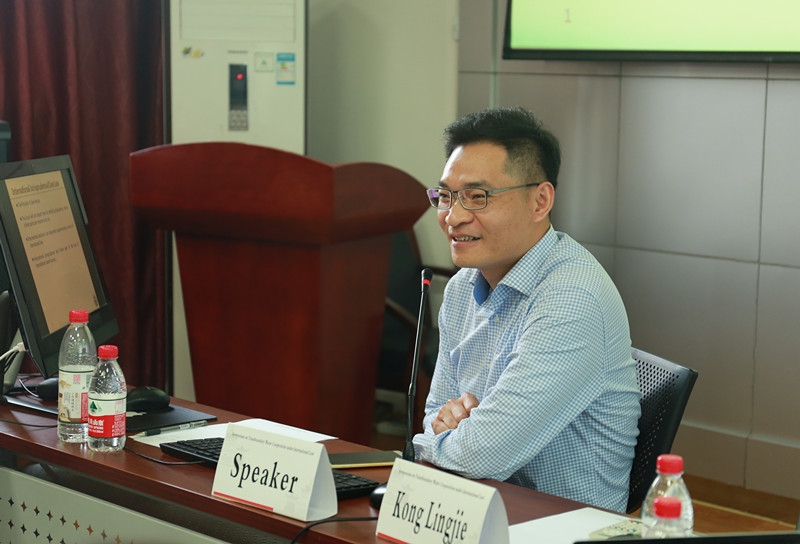
孔令杰教授的演讲题为《国际水法国际判例法理专题研究》。他首先解释了国际司法判例法理对于国际水法这一日益重要的国际公法部门的意义。他对常设国际法院、国际法院和其他法庭或仲裁庭审理的国际水道争议案件进行了全景描绘,并按主题和适用法律对这些案件进行了分类。他将案件中涉及的问题归为五类:确认国际水道在国际法上的性质、范围和显著特点,国际水法的原则,水道国的主权和权利,水道国的义务,以及水道国对其国际不法行为承担的国家责任。接着,孔令杰教授集中阐述了国际水法的基本原则之一,即公平合理利用原则。他介绍了《联合国水道法公约》对该原则的规定,并指出国际法院和仲裁庭在案件中多次援引该原则,承认该原则是国际水法的基本原则之一,但从未解释或适用《联合国水道法公约》第5条和第6条,也从未仅依据一般国际法上的公平合理利用原则作出裁判。随后,他详细讲解了四个国际司法案例:默兹河取水案错失了适用该原则的机会;拉努湖仲裁案对与该原则相关的问题作了阐述;加布奇科沃-大毛罗什项目案是对这一原则的适用;乌拉圭河纸浆厂案法院根据这一原则拒绝了当事国的部分诉求。
Prof. Kong Lingjie presented his research on International Jurisprudence of the Law of International Watercourses. He started by explaining why international jurisprudence matters for this increasingly important section of public international law. He sketched a picture of the cases concerning disputes over international watercourses settled by the PCIJ, ICJ and other tribunals. He categorized those cases by subject matter and applicable law, and categorized issues and questions addressed by the international courts and tribunals into five groups: a determination of the international nature, scope and salient features of international watercourses in international law, the principles of the law of international watercourses, sovereignty and rights of the watercourse States, obligations of the watercourse States and State responsibility of watercourse States for their internationally wrongful acts. Then Prof. Kong focused on the fundamental rule of the law of international watercourses, i.e., the principle of equitable and reasonable use. He introduced the principle laid down in the UN Watercourses Convention, and made an overall judgement that the courts and tribunals recognize that this principle constitutes the basic rule for the law of international watercourses, yet have not interpreted or applied Articles 5 and 6 of the UN Watercourses Convention, or adjudicated solely by this principle in general international law. Then he highlighted four cases to illustrate his observations in greater detail. He defined the Meuse River case as a missed opportunity to apply this principle, Lake Lanoux Arbitration as an elaboration on relevant issues, the Gabčíkovo-Nagymaros Project case as an application of this principle, and the Pulp Mills case as a rejection of certain submission based on this principle.
4. 张帆 Zhang Fan
武汉大学中国边界与海洋研究院讲师
Lecturer of public international law at Wuhan University China Institute of Boundary and Ocean Studies
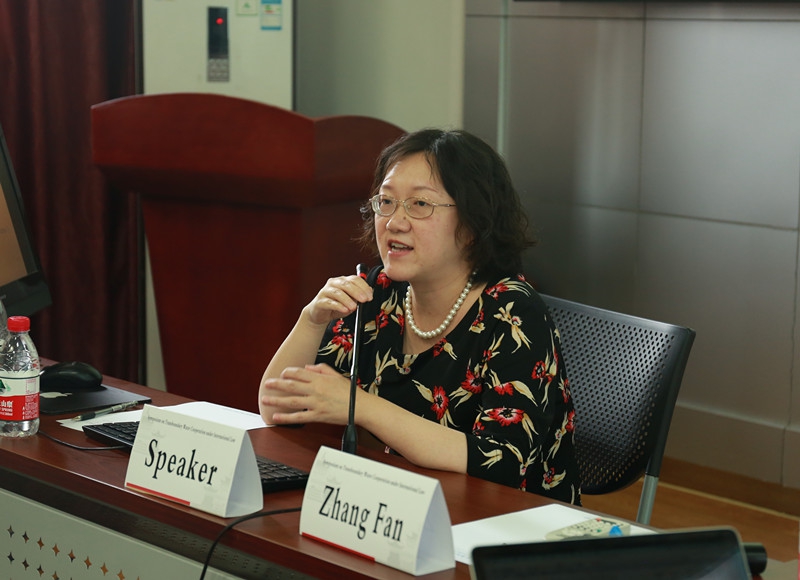
张帆博士的发言题目是《欧经委水公约全球开放的最新进展、意义和挑战》。她首先回顾了《欧经委水公约》从区域性公约演变为全球性公约的历史进程,介绍了2016年3月1日公约正式向全球开放以来在域外扩员和提升影响力的最新进展。她比较了《欧经委水公约》和《联合国国际水道法公约》的异同,分析了欧经委水公约全球开放的意义,尤其是它对中国的影响:理论上中国也成为可以加入该公约的国家;中国的有些邻国已是公约成员,或表达了加入公约的意愿;公约全球开放将增强其对习惯国际法发展的影响。她特别介绍了公约全球开放后的一项重要工作,即与公约执行报告程序相结合的《联合国可持续发展目标指标6.5.2基线报告》,其中提及中国与邻国之间跨界流域合作安排的缺失或不足。最后她指出,为了回应欧经委域外国家尤其是缺水国家的需求,公约已将水资源分配问题提上议程,计划在2019-2021工作周期出台软法文件《跨界水分配指南》。
Dr. Zhang Fan gave a presentation on Global Opening of the UNECE Water Convention: Development, Implications and Challenges. She started by reviewing the global opening process of the UNECE Water Convention, and some new developments since March 1, 2016, when the Convention became eventually open to all the UN members. She compared the UNECE Water Convention and the UN Watercourse Convention and identified the similarities and differences between these two international framework conventions. Next, she analyzed the implications of the Convention's global opening, with a focus on its influence on China. Theoretically China has become one of the states that may choose to accede to the Convention, while some of China's neighbors are either Parties, or have expressed the willingness of joining the Convention. What is relevant to China also includes the Convention's increasing influence on the development of customary international law. Among the highlights of the work programme for the Convention for the period 2016-2018, she brought our attention to the Baseline report on SDG indicator 6.5.2 combined with the pilot reporting exercise under the Convention. The contents concerning China include Transboundary basins lacking basin-wide arrangements and transboundary basins lacking any arrangements for cooperation. Lastly, she pointed out that responding to the interests of the outside-region countries, especially the demands from the water-starved countries, work on the water allocation has been put on the UNECE Convention's agenda. A Handbook on Water Allocation in the Transboundary Context will be developed in the 2019-2021 work programme for the Convention.
议题二:跨界水合作与国际法——相关法律问题
Session II: Transboundary Water Cooperation and International Law: Relevant Legal Issues
主持人/Chair:邬霈莎/Patricia Wouters
评议人/Commentators:谢尔盖·维诺格拉多夫/Sergei Vinogradov,孔令杰/Kong Lingjie
5. 欧文·麦金太尔 Owen McIntyre
爱尔兰科克大学法学院教授,环境与自然资源法硕士项目负责人,法律与环境中心联合主任
Professor and the Director the LLM (Environmental & Natural Resources Law) Programme at the School of Law, University College Cork, Co-Director of the newly established Centre for Law and the Environment (CLE) at UCC
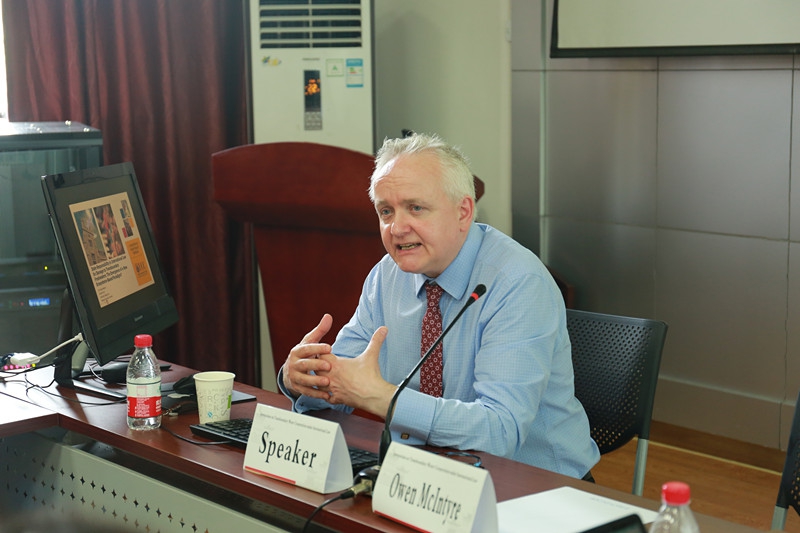
欧文·麦金太尔教授的发言题为《跨界水损害中的国家责任——基于生态系统的新范式?》。首先,他指出了国际水法中国家责任面临的四种挑战:(1)实质性规则的规范不确定性;(2)程序规则的规范性;(3)环境规则的日益自主性;(4)关于国家责任的国际规则碎片化。关于跨界环境损害的民事责任,他提到了2006年国际法委员会通过的《关于危险活动造成跨界损害案件中损失分配的原则草案》和2003年联合国欧洲经济委员会的《工业事故对跨界水域的跨界影响所致损害的民事责任与赔偿议定书》。此外,跨界损害的救济办法应遵守《联合国国际水道法公约》第32条规定的不歧视规则。随后,欧文教授介绍了国际水法中共同责任的承担,以及国家责任争端解决的其他形式,其中包括非正式/临时安排和履行公约机制。最后,欧文教授分享了他对生态系统产品和服务功能丧失或减损所引发的国家责任和修复赔偿义务这一最新发展的见解。他介绍了国际法院2018年判决的圣胡安河航行权与相关权利案的赔偿部分,并预期将出现一种新的基于生态系统的国家责任承担模式,尤其是在国际水法领域。
Prof. Owen McIntyre's presentation was on State Responsibility in International Law for Damage to Transboundary Freshwaters: The Emergence of a New Ecosystems-Based Paradigm? At first, he identified four types of sources of challenges with respect to state responsibility in international water law: (a) normative indeterminacy of substantive rules, (b) normative nature of procedural rules, (c) growing autonomy of environmental rules, and (d) fragmented international rules on state responsibility. In terms of civil liability for transboundary environmental harm, the 2006 ILC Principles on Allocation of Loss in Case of Transboundary Harm from Hazardous Activities and 2003 UNECE Protocol on Civil Liability for Damage re Transboundary Waters were mentioned. Also, remedies for transboundary harm is subject to the non-discrimination rule codified in Article 32 of the UN Watercourse Convention. Then, Prof. Owen McIntyre introduced international water law governing joint/shared responsibility, which is typical in cases of transboundary environmental harm. Alternative forms of dispute resolution regarding state responsibility were discussed briefly, which include informal/ad hoc arrangements and convention compliance mechanisms. In the last part, Prof. Owen McIntyre shared his insights on the recent development on State responsibility, reparation and compensation for impairment to and loss of ecosystem goods and services. He introduced the San Juan River: Certain Activities (Compensation) case adjudicated in 2018, and anticipated the emergence of a new ecosystems-based paradigm concerning state responsibility, especially in the realm of international water law.
6. 奥托·斯派克斯 Otto Spijkers
荷兰乌特勒支大学国际法讲师,荷兰海洋法研究所与乌特勒支大学水、海洋与可持续发展法中心研究员
Lecturer of public international law at Utrecht University, Senior Research Associate with the Netherlands Institute for the Law of the Sea, and researcher with the Utrecht Centre for Water, Oceans and Sustainability Law
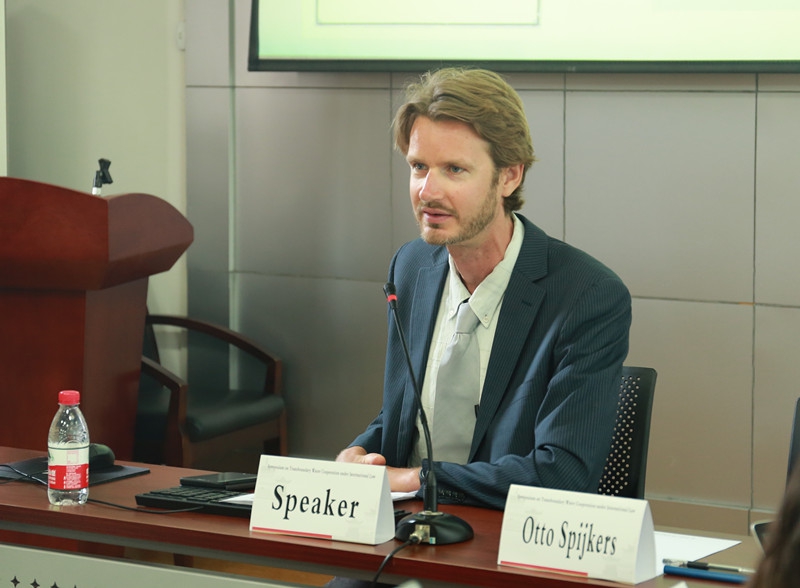
奥托·斯派克斯博士的发言题目为《关于国际法院在审案件智利-玻利维亚西拉拉水域地位和使用争端的思考》。首先,他简要介绍了案件事实和争议河流的基本地理情况,回顾了程序性事项,并评价智利率先起诉具有策略性意义。对案件的实体部分,他详细阐述了本案涉及的三个法律问题。首先,关于适用法律,由于智利和玻利维亚都不是《联合国国际水道法公约》的缔约国,所以必须确定《联合国国际水道法公约》是否可以作为习惯国际法适用。第二,西拉拉河水系,包括其地下含水层是否构成国际水道。为此,需要查明《联合国国际水道法公约》第2条中对“国际水道”的定义。但奥托·斯派克斯博士对第2条是否能解决这个问题持怀疑态度,认为它只限定了《联合国国际水道法公约》的适用范围。接着,如果西拉拉河被认定为国际水道,智利有权公平和合理地使用西拉拉河,玻利维亚则负有不对智利造成重大损害以及与智利开展合作的义务。因此,第三个问题以当事国的权利和义务为焦点。最后,他介绍了智利提交的各种证据。
Dr. Otto Spijkers gave a presentation on Reflections on the Dispute over the Status and Use of the Waters of the Silala between Chile and Bolivia currently pending before the International Court of Justice. At the beginning, he briefly introduced the case pending before the ICJ and basic geographic situations of the river in dispute. He recalled the procedural proceedings and commented that it was strategic for Chile to first file the application. On the merits, he expounded three legal issues in the case. First, as to the applicable law, since neither Chile or Bolivia is a party to the UN Watercourses Convention, it must be determined whether the UN Watercourses Convention can be applied as evidences of customary international law. Second, whether the Silala River system, including the underground aquifer, is an international watercourse. To this end, the definition of “international watercourse” in Article 2 of the UN Watercourses Convention needs to be examined. But Dr. Otto Spijkers doubted that Article 2 could solve this question since it only limits the scope of the UN Watercourses Convention. Then, if Silala River is found to be an international watercourse, Chile is entitled to the equitable and reasonable use of Silala River, and Bolivia is obliged not to cause significant harm to Chile and to cooperate with Chile. Thus, the third issue centers on their rights and obligations. Lastly, he introduced various kinds of evidences produced by Chile.
7. 苏宇 Su Yu
Assistant Professor of international law at Xiamen University Law School
厦门大学法学院助理教授
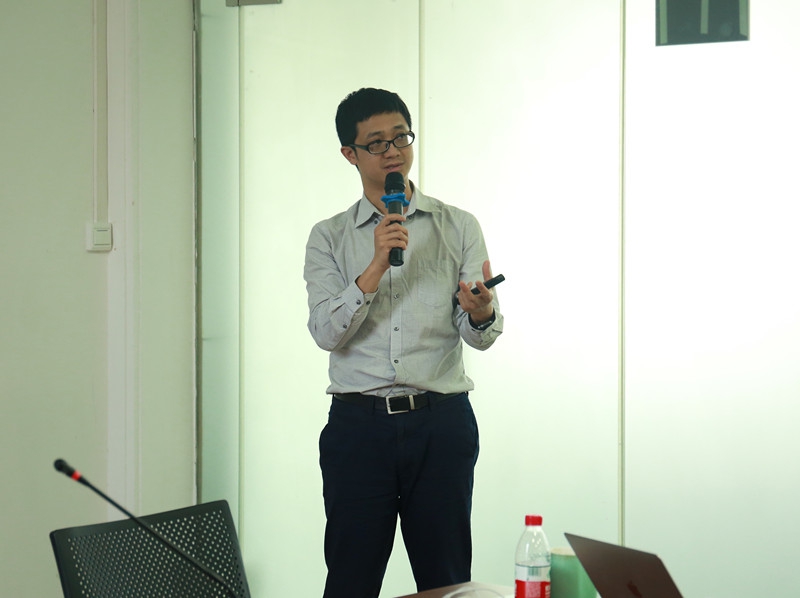
苏宇博士演讲的题目是《国际法话语权与规范性的沟通方法——中国国际水法实践》。话语权的概念由福柯提出,正广泛地应用于社会科学领域。苏宇博士指出,在中国提倡全球治理新理念和提升国际话语权的大背景下,话语权需要经过必要的调整才能运用于国际法,尤其是国际水法。他首先介绍了国际法的沟通之维,阐述了“沟通性框架”如何通过因素间的相互作用和相互影响运作,以及如何在国际法沟通过程中对规范性起作用。然后,他把这一框架应用于分析中国在跨界水方面的实践,并回顾了国际水法规范性在《联合国国际水道法公约》通过之前、之后和现阶段的发展演变。透过沟通性框架分析的视角来看中国实践,他展示了中国是如何参与国际水法规范性的形成和发展的,并认为中国越来越多地参与多边论坛表明中国正在参与并积极促进国际水法规范性发展。基于此,他得出三点关键结论:(1)仅仅强调话语权层面不足以使一个国家在国际法的运作过程中取得预期的结果。(2)话语权力并不自动等同于规范性权力。(3)国际法的运作需要规范性与沟通要素共同作用。
Dr. Su Yu presented his study on A Communicative Approach to the Relationship between Discourse Power and the Normativity of International Law—with a Special Focus on China's International Water Law Practice. Against the background of China’s call for a new set of global governance concept and a shift in discursive power, he argued that, discursive power, as a concept originally coined by Foucault and applied mainly in the field of sociology, cannot be transposed to international law without necessary adaptations, and international water law is a case in point. First, he introduced the communicative dimension to international law and explained how the factors of communicative framework, by interacting with and impacting upon each other, contributes to normativity in international law in the communicative process. He then applied this framework to the analysis of China's practice in relation to transboundary waters. He took a historical inquiry into the development of normativity of international law in the following periods, that is, pre-UNWC, post-UNWC and the present. Looking at China's practice through the lens of the communicative framework, he showed that how China was and has been involved in the forming and development of normativity in international water law, and argued that China, through increasing use of multilateral fora, are becoming better at contributing its understandings of international water law to normativity in this field. He concluded with two key takeaways from his study are: (a) The sole emphasis on the power dimension of discourse is not sufficient in enabling a state to achieve a desired outcome in the process of operation of international law. (b) Discursive power does not automatically amount to normative power. (c) International law operates in a space where normativity arises from the communication/interaction of various elements.
议题三:中国与周边国家间的跨界水合作——法律、政策、技术
Session III: Transboundary Water Cooperation between China and the Neighbouring Countries: Law, Policy and Technical Perspectives
主持人/Chair:欧文·麦金太尔/Owen McIntyre
评议人/Commentators:邬霈莎/Patricia Wouters
8. 谢尔盖·维诺格拉多夫 Sergei Vinogradov
英国邓迪大学能源、石油和矿产法律与政策中心教授
Professor of the Centre for Energy, Petroleum and Mineral Law and Policy, University of Dundee, Scotland, UK
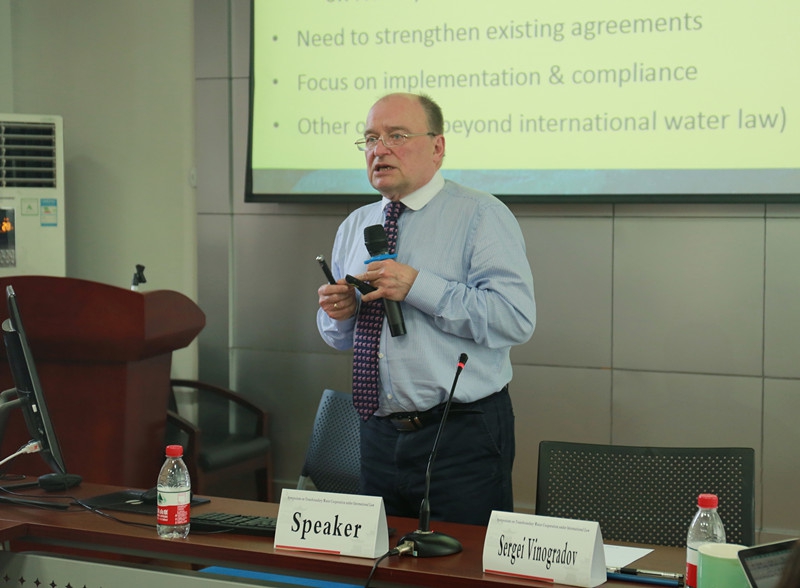
谢尔盖·维诺格拉多夫教授发言的题目是《中国与跨界水——北方邻国视角》。他首先提出水是亚洲整体环境下的一个安全因素,并介绍了中国北方的主要跨界流域,即阿穆尔河流域和额尔齐斯河流域的基本情况。他指出,国家间跨界水需求和利益间的冲突为满足各方利益带来了挑战。他认为,国际法作为一项“游戏规则”,在水事制度中起着三项关键作用。接着,他通过列举中俄、中哈双边涉水条约,回顾中俄、中哈跨界水合作的历史,明确了中国目前在北方跨界水流域制度中的几个关键问题:(1)额尔齐斯河是一条国际河流,但部分受中哈双边协定规制,部分受哈俄协定规制;(2)北方流域缺乏协调机制和流域综合管理机制;(3)中国西北地区的缺水问题日益严重;(4)需要建立一个由有效的制度机制保障的三方法律制度。他同时指出,仅依靠国际水法不足以解决这些问题,跨界水合作应当超越法律。他以供水管道项目为例来说明中国在此方面做出的努力,但也指出该项目可能引发新的法律问题。最后,他评价道,中俄、中哈在跨界水制度上总体取得了很大的成就,但由于双边协定的性质和合作范围的狭窄,其合作在某种程度上受到限制,并建议中国应采取行动,完善现有协定,促进协定执行和遵守,并积极探索国际水法以外的各种解决办法。
Prof. Sergei Vinogradov gave a presentation titled “China & Transboundary Waters: The Northern Neighbours' Perspective”. He started by recognizing that water is a security factor in the Asian context, and introduced the basic information of major river basins in northern China, i.e., the Amur River Basin and the Irtysh River Basin. He pointed out that there exist competing demands and conflicting interests over transboundary waters, which lead to the challenge: how to ensure water for all parties concerned? He construed that international law plays as “rules of the game” and serves three key functions in water regime. In retrospect, he enumerated Sino-Russian and Sino-Kazakh bilateral water treaties and reviewed the history of the Sino-Russian and Sino-Kazakh transboundary water cooperation. Several critical issues of China's current transboundary waters regime in terms of northern river basins were identified, i.e., (a) the Irtysh River is an international river governed partly by bilateral China-Kazakhstan agreements and partly by Kazakhstan-Russia agreements, (b) lack of coordination and lack of integrated basin management, (c) growing water deficit in the North-Western part of China, (d) the need for a trilateral legal regime supported by an effective institutional mechanism. He indicated that international water law alone is not enough to solve those problems and transboundary water cooperation should extend beyond water law. He treated Water pipeline project as an example of China's efforts in this regard, and cautioned that possible new legal issues may be triggered by the project. Overall, he remarked that Sino-Russian and Sino-Kazakh transboundary waters regime has made substantial achievements but is somehow limited by its bilateral nature and narrow scope of cooperation. China should take action to strengthen the existing agreements, promote implementation and compliance, and explore various solutions beyond international water law.
9. 陈霁巍 Chen Jiwei
水利部国际经济技术交流合作交流中心总工程师
Chief Engineer of the International Economic & Technical Cooperation and Exchange Center, Ministry of Water Resources of the P.R.C
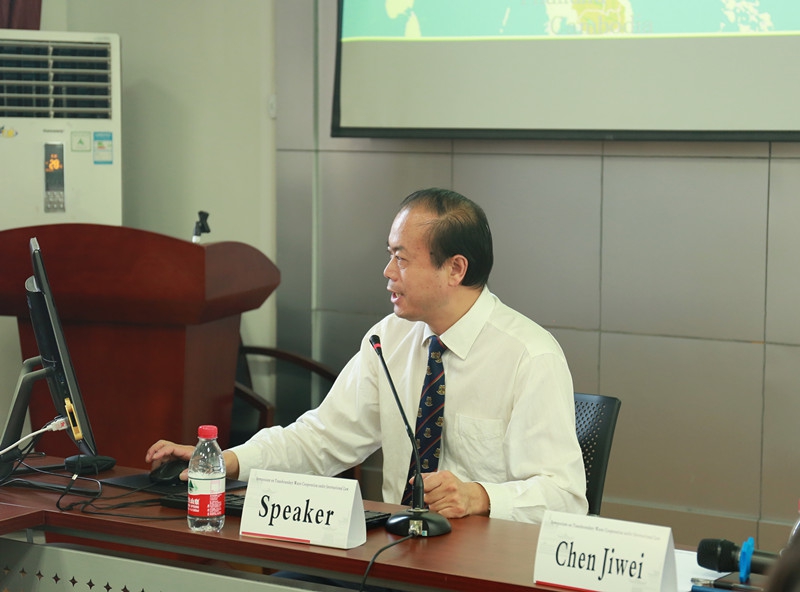
陈霁巍教授总结了中国与周边国家的跨界河流合作情况。首先,他介绍了中国跨界河流概况,指出中国13个接壤国和3个邻近国大多数与中国水利部建立了友好关系。他介绍了中国开展跨界河流合作的机制,指出中国遵循以人为本、公平合理、开发与保护并重、睦邻友好合作的原则。他接着简要介绍了中国的跨界河流合作实践,包括中国与澜沧江-湄公河流域国家、中国-印度、中国-朝鲜、中国-哈萨克斯坦、中国-俄罗斯、中国-蒙古以及中国-孟加拉国水资源合作情况。他强调,现有的跨界水机制在保持中国与周边国家的合作与促进信息交流方面发挥了重要作用。最后,他表达了对未来跨界水合作的展望。他强调,上游和下游国家都有发展的权利和保护共享流域的义务。科学、可持续地利用水资源是维护区域和平与繁荣的保障。通过科学的规划和综合评价,保证发展共享、减少破坏和保护生态环境,是我国的必然要求。在展望中,他还表示,中国将坚持与周边国家建立友好合作关系的宏伟邻国政策,遵循公平合理利用原则和不造成重大损害原则,充分利用与周边国家建立的合作机制,深化同周边国家关系,使跨界河流成为“和平之河、合作之河、友谊之河”。
Prof. Chen Jiwei presented a summary on the transboundary water cooperation between China and its neighboring countries. First, he gave an overview of transboundary rivers in China by mentioning that there are 13 bordering countries and 3 neighboring countries around China, most of which have established good relations with China’s Ministry of Water Resources. He introduced China’s principles and mechanisms of transboundary rivers and pointed out that China follows the principles of people-oriented, fairness and rationality, equal emphasis on development and protection, good neighborly friendship and cooperation. Then China’s practices of transboundary water cooperation were introduced briefly, including Lancang-Mekong countries, China-India, China-North Korea, China-Kazakhstan, China-Russia, China-Mongolia and China-Bangladesh water resources cooperation. He underlined that the existing mechanisms relating to transboundary water have played important roles in maintaining cooperation and promoting information exchange between China and its neighboring countries. At the end, he communicated his outlook on China’s transboundary water cooperation. He emphasized that upstream and downstream countries both have their rights to develop and obligations to protect the shared river basins. Scientific and sustainable utilization of water resources is fundamental for regional peace and prosperity. It is necessary for China to ensure benefit sharing, damage reduction, and ecological environment conservation through the means of scientific planning and comprehensive evaluation. In prospect, he was of the view that China will follow the grand neighbouring policy of building friendship and partnership with the neighboring countries, stick to the principles of fair and reasonable utilization and the general rule of no significant harm, deepen its relations with neighboring countries through mechanisms, and promote peace, cooperation and friendship.
10. 大卫·德夫莱明克 David Devlaeminck
重庆大学法学院讲师
Lecturer at Chongqing University School of Law
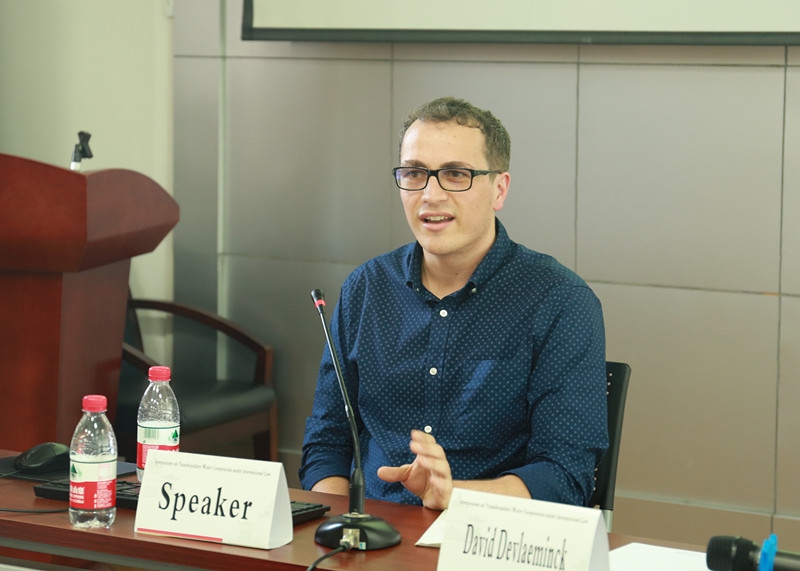
大卫·德夫莱明克博士的报告题为《重新审视中国对联合国国际水道法公约的反对票》。他强调了中国法律合作的不断发展、跨界水条约日益向国际公约看齐的现实,以及公约对中国的潜在利益,从而解释了为何有必要重新审视中国对联合国水道法公约投反对票的原因。大卫·德夫莱明克博士深入剖析了中国对公约投反对票的四点理由。针对理由一“《公约》草案未能代表或反映所有国家的普遍共识”,他认为,尽管各国在公约起草过程中进行了激烈的辩论和存在重大分歧,但公约草案在联合国大会投票中得到了大力支持。针对理由二“《公约》草案未能体现作为国际法基本原则的领土主权原则”,他认为,虽然公约没有明确提及主权,但《公约》是以限制领土主权概念为基础的。他特别强调,与一些学者的观点相反,中国从未主张绝对领土主权,且中国的国家实践反映了限制领土主权概念要求的方式。针对理由三“《公约》草案关于国家权利和义务的条款对上、下游国家明显不平等”,他基于自己的研究认为,《公约》提供了一种互惠的、公平的和平衡的办法,能够保护中国作为上游国的利益。针对理由四,即中国认为《公约》中的强制性事实调查机制违反了联合国宪章,他认为事实调查有可能促进谈判,并提到《公约》并没有强制水道国提供对其国防或安全至关重要的数据或信息。作为结论,大卫·德夫莱明克博士认为,加入《公约》会有益于中国,但中国关于争端解决机制的立场仍然与《公约》的强制性事实调查机制无法协调。为支持其结论,他还提到《跨界含水层法条款草案》,为进一步研究中国对跨界水条约的立场做了铺垫。
Dr. David J. Devlaeminck gave a presentation entitled Revisiting China's Vote Against the UNWC: Time to take a second look? In highlighting China's growing legal cooperation, increased alignment between China's treaties and the global Conventions and potential benefits for China, he explained why it may be necessary to revisit China's vote on the United Nations Convention on the Non-navigational Uses of International Watercourses (UNWC). Dr. Devlaeminck concentrated on China's four reasons for its vote against the draft, revisiting each in depth. First, China stated that “the draft Convention fails to represent or reflect general agreement by all countries”. However, even though there was significant debate and disagreement during the drafting process between States, the draft received significant support at the General Assembly vote. Second, China states that “the draft Convention does not affirm territorial sovereignty which is a basic principle of international law”. Although the UNWC does not explicitly recognize sovereignty, it is based on the notion of limited territorial sovereignty. In particular, Dr. Devlaeminck stressed that, contrary to some scholars' views, China has never made a claim of absolute territorial sovereignty and that its practices illustrate its limited territorial sovereignty approach. Third, China stated its belief that “in the draft Convention's provisions regarding the rights and obligations of States there is an obvious imbalance between upstream and downstream countries”. Based on his previous research, however, Dr. Devlaeminck explained that UNWC offers a reciprocal, fair and balanced approach able to protect China's upstream interests. As to the fourth reason, China viewed mandatory fact finding as against the UN Charter and was particularly concerned by compulsory fact-finding. However, the presentation illustrated his view that fact-finding has the potential to support negotiations, further mentioning that the UNWC does not “oblige a watercourse State to provide data or information vital to its national defense or security.” In conclusion, Dr. Devlaeminck indicated that acceding to the UNWC could benefit China, but that China's stance on dispute settlement remains at odds with UNWC's compulsory fact-finding mechanisms. In support of his conclusions, he mentioned the Draft Articles on Transboundary Aquifers as a prelude for further study on China's positions towards transboundary water treaties.
11. 郭利颖 Guo Liying
清华大学水利水电工程系博士研究生
PhD candidate at Department of Hydraulic Engineering, Tsinghua University
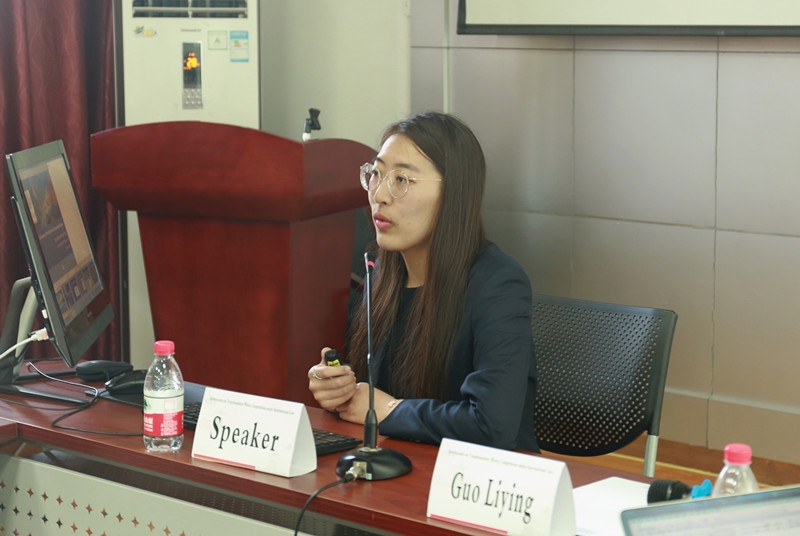
博士生郭利颖代表田富强教授介绍了他们团队正在进行的“跨界河流冲突与合作的数据分析”研究。郭利颖指出,目前跨越一个以上国家的国际河流有310条,覆盖了地球40%以上人口和陆地面积,跨界河流管理影响着一个国家的境内外可持续发展,因此对全球的水安全起着重要作用。然而因为各沿岸国在水资源管理制度、优先事项和水资源文化方面存在差异,对水资源的重视程度不同,跨界水资源系统的特点往往是冲突与合作并存。冲突事件往往因沿岸国之间水需求和管理偏好之间的冲突而产生。因此,她强调,理解冲突的程度和沿岸国选择冲突与合作的动因,对于探析跨界水系统和促进水资源管理的可持续发展至关重要。田富强教授团队的研究旨在揭示全球层面冲突与合作事件的模式和动因。为此,他们通过收集大量的新闻媒体数据,并利用技术对数据进行深入挖掘和分析,揭示了全球性跨界水冲突与合作事件的时间趋势和空间分布规律。田富强教授团队绘制了一张有时间表的世界地图,以显示跨界水冲突、合作是如何发生、发展和转变的,并通过探寻跨界水冲突与合作的周期特征,促进跨界水资源管理,为水资源决策者提供启发,提高全球水安全水平。
On behalf of Prof. Tian Fuqiang, Guo Liying presented their research on Transboundary Rivers Conflict and Cooperation Database. She pointed out there are 310 international river basins that span more than a single country covering more than 40 percent of the Earth’s population and land area. Transboundary river management affects sustainable development within and beyond a country’s borders, thus plays a critical role for global water security. However, transboundary river systems are often characterized by conflict and cooperation. This is because that riparian states value the water differently, thus differ in water management regime, priorities and culture for water resources. Conflictive events often arise due to conflicting demand and management preferences among riparian states. She underlined that understanding the level of conflicts and the dynamics that drive the choices between conflict and cooperation is therefore critical in gaining insights of the complex transboundary systems, and in assisting with sustainable water management. Their study aimed to uncover the patterns and dynamics of conflictive and cooperative events on a global scale. To achieve this goal, they explored the temporal trends and spatial distribution of conflictive and cooperative events globally by collecting large news media datasets, and then employing machine learning techniques to do data mining out of those news media data. They intended to draw a world map with a timeline to show how water conflict, and cooperation occurs, grows, and transforms. By capturing characteristics of the life cycles of water conflict and cooperation, they aimed to throw light upon water management in transboundary river basins, provide some hints for water resources decision-makers, and enhance global water security.
本记录由赵雨晴、贺舒婷撰写,张帆、孔令杰核改,部分摘要由发言人提供。
This record was composed by Zhao Yuqing and He Shuting, revised by Zhang Fan and Kong Lingjie. Some of the abstracts were provided by the speakers.





